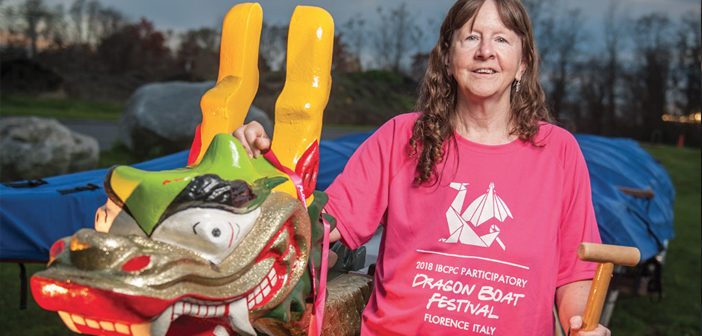By: Elizabeth LaFond Coppez, ’03, M’07
Meg O’Hare ’77, M.Ed. ’97 received a breast cancer diagnosis in September 2014, only one month after retiring from her 34-year teaching career. “I was completely overwhelmed,” she says. “My teaching experiences and experiences at Westfield State helped me find the inner strength I needed to fight cancer.”
While at the Cancer House of Hope in West Springfield, O’Hare saw a flyer about dragon boating and breast cancer survivors. “I thought if dragon boating is for people who survived what I’m about to go through, maybe I should be around them.”
She signed up to take part and started training the same month she began chemotherapy treatment, in January 2015. “There is simply not enough room in this magazine for me to tell you how much my dragon boating team helped me,” O’Hare says. “They became my second family, and they are such an important part of my life.”
Dragon boating began in ancient China with wooden crafts; today, the sport centers around fiberglass canoes with a dragon head and tail. O’Hare is a member of the Paradise City Team, based in Northampton; members train twice a week on the Connecticut River mid-April through October and on the first Saturday of the month. “Our trainings are two hours on the water,” O’Hare adds. “We do sprints and practice technique. Synchronicity is key!”
The dragon boat has 20 paddlers, a drummer, and someone to steer. Each person operates one oar. “We weight train during the winter months when we aren’t on the river,” O’Hare adds. Her team has won gold medals in competitions in Boston; Burlington, Vermont; and Hartford, Connecticut.
In July 2018, O’Hare, of Hampden, competed in a race held every four years by the International Breast Cancer Paddlers Commission. A Vermont team, Dragonheart, had open slots, and O’Hare and her teammate Anna Symington were asked to join. “We set out for Florence, Italy, and joined an estimated 4,000 to 5,000 breast cancer survivors from around the world,” O’Hare says. “Fighting and surviving breast cancer was our common thread. It was an amazing experience—very joyful and powerful!”
O’Hare says her international team competed in three races a day, and they were among 129 teams from around the world. “You know, breast cancer leaves its mark. Treatment is brutal,” she says. “But, if someone told me breast cancer would open this new world for me, I never would have believed it. What I thought was the worst thing that could have happened to me turned out to give me opportunities and take me places.”



